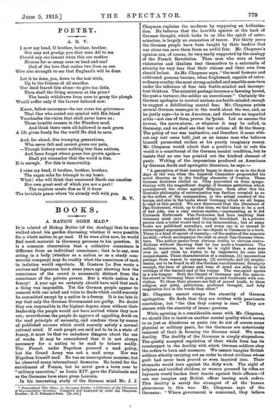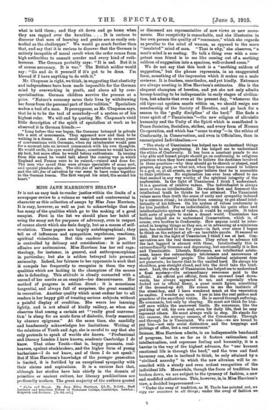BOOKS.
A NATION GONE MAD.*
IT is related of Bishop Butler (of the Analogy) that he once walked about his garden discussing whether it were possible for a whole nation to go mad. If he were alive now, he would find much material in Germany germane to his question. It is a common observation that a collective conscience is different from an individual conscience ; that is to say, men acting in a body (whether as a nation or as a shady com- mercial company) may do readily what the conscience of each in isolation would reprobate. M. Gustave Le Bon wrote a curious and ingenious book some years ago showing how the conscience of the crowd is necessarily distinct from the conscience of the private person. But a whole nation in a frenzy! A year ago we certainly should have said that such a thing was impossible. Yet the German people appear to consent with one mind and voice to deeds which could scarcely be committed except by a nation in a frenzy. It is too late to say that only the German Government are guilty. No doubt they are responsible in the highest degree, since without their leadership the people would not have arrived where they now are; nevertheless the people do approve of appalling deeds on the mad principle of necessity, and condone them by means of published excuses which could scarcely satisfy a normal rational mind. If such people are said not to be in a state of frenzy, it must be that we onlookers disagree about the use of words. It may be remembered that it is not always necessary for a nation to be mad to behave madly. The French under Napoleon pursued a mad policy, but the Grand Army was not a mad army. Nor was Napoleon himself mad. He was an unscrupulous monster, but he observed many international decencies. He looted for the enrichment of France, but he never gave a town over to "military execution," as Louis XIV. gave the Palatinate and as the Germane have since given Louvain.
In his interesting study of the German mind Mr. J. J.
• Deutschland itbor s; or, Germany Spook.: a Collodion of the Manama, of RepresodatIve Germans. Compiled and Analysed by John Jay Chapman. London, G. P. Putnam'. Sons. pe. net.] Chapman explains the madness by supposing an hallueina. tion. He believes that the horrible spectre at the back of German thought, which looks to us like the spirit of exter. mination, hi largely an emanation of terror. For thirty years the German people have been taught by their leaders that war alone can save them from an awful fate. Mr. Chapman' opinion can, of course, be very easily supported by the analogy of the French Revolution. Then men who were at heart visionaries and idealists lent themselves to a saturnalia of atrocity for very fear that their visions and their own lives should be lost. As Mr. Chapman says, "the most humane and cultivated persona become, when frightened, capable of extra. ordinary cruelty; the most strong-minded and sensible men turn under the influence of fear into feeble-minded and incompe- tent thinkers. The scientist perhaps becomes a fawning hound, the poets torturer, the soldier an executioner." Certainly the German apologies to neutral nations are feeble-minded enough to suggest a debilitating mental fear. Mr. Chapman prints several German messages to the world about the war, and, as he justly says—he is an American, and therefore an impartial critic—not one of them proves its !point. Let us assume the fervour, the nerve-storm, or whatever it may be called, in Germany, and we shall see that her actions all fit the theory. The policy of war was instinctive, and therefore it came with- out any real carpus belli, just as an insane man who believes himself persecuted strikes at his purely imaginary enemy. Mr. Chapman would admit that a positive lust to rule the world is a constituent of the German mental condition, but be insists that no one has pointed out the kindred element of panic. Writing of the impressions produced on Americans by German deeds and apologetic literature, he gays :— " A perception of their insanity began to dawn onus in the ilrat days of the war, when the Imperial Chancellor propounded his novel theories as to the binding charsoter of treaties. These German doctrines chilled us. They prevented us from sympa- thizing with the magnificent display of German patriotism which accompanied the crime against Belgium. Soon after this the Teutonic philosophy of extermination was further revealed to us in the orders of the commanders, in the actual conduct of the troops, and also in the books about Germany which we all began to read at this period. We now discovered that the literature of Pan-Teutonism, which, up to this time, we had taken to be a sort of bad joke, was a very serious matter,—Irepresenting as it did Unreason Enthroned. Pan-Teutoniam had been towelling that Germany must gave mankind through bloodshed. In a private person such,, belief would lead to his incarceration; but as many books are published nowadays, and every one is so enured to extravagant arguments, that no one objects to Unreason in a book. There is a kind of squint of insanity,—of the malice of the neurotic invalid,—which accompanies the text in much Pen-German litera- ture. The author passes from obvious truths to obvious contra, dictions without knowing that he has made a transition. The author, moreover, is more sure he is right than a sane man ever is; and when ha wiehes to be impressive he runs into megalomania. These characteristics of,, madman, (1) unconscious passage from reason to unreason, (2) certitude, and (3) megalo- mania, are to be found in all the German war-literature. Strangely enough, the turn of phrase and tone of mind are alike in the writings of the learned and of the vulgar. The war-spirit speaks ins. war-tongue. Both the literati of Germany and the man-in- the-street in Germany blaze with passion and vociferate with con- viction. To them their phrases are full of sacred truth, to them religion and piety, patriotism, profound thought, and holy inspiration live in the words they utter."
Mr. Chapman cannot escape the sincerity of Germs. apologetics. He finds that they are written with passionate conviction; but "the idea they convey is zero." They are sincere with the sincerity of insane persons.
While agreeing in a considerable Benue with Mr. Chapman, we should like to insist on another mental quality which seem, to us just as disastrous as panic (we do not of course mean physical or military panic, for the Germans are notoriously innocent of that) in forming the German mind. We mean docility. The docility of the Germane is simply stupendous. The quietly accepted regulation of their whole lives has its counterpart in the docility with which German soldiers obey the orders to burn and massacre. We cannot imagine British soldiers silently carrying out an order to shoot civilians whose guilt had never been proved or even inquired into. Their stomachs would turn against the dirty work. The sight of helpless and terrified children or women pursued by rifles or bayonets would harden their hearts against their officers—if one can imagine any British officer issuing such orders. This docility is surely the strangest of all the human phenomena in this war. Mr. Chapman says of the Germans "Where government is concerned, they believe
what is told them ; and they sit down and go home when they are rapped over the knuckles. . . . It is curious to discover that men of learning and genies are as easily con- trolled as the clodhopper." We would go much further than that, and say that it is curious to discover that the German is entirely incapable of moral revolt when the order comes from high authorities to commit murder and every kind of ruth- lessness. The German probably say.: "It is Bad. But it is of course necessary. It is war." The British soldier would say : "Go and do it yourself if it's got to be done. Fm blowed if I have anything to do with it."
Mr. Chapman is right, we think, in suggesting that elasticity and independence have been made impossible for the German mind by overworking in youth, and above all by over- specialization. German children survive the process at a price. "Nature's economy saves their lives by withdrawing her force from the personal part of their volition." Specialism makes a tool of a man. It presupposes, as Mr. Chapman says, that he is to be the tool of somebody—of a system or of his highest ruler. We will end by quoting Mr. Chapman's vivid little description of the spirit of specialism at work as he observed it in German friends :—
" Long before this war began, the Germans betrayed in private life a sort of monomania. They appeared now and then to be walking in a dream. I can recall many instances in recent years of conversations with Germans, when my interlocutor would pass for a moment into an inward communion with his own thoughts. He would smile, his eyes would gleam; sometimes he would have a sly look, but more often he would betray enthusiasm. In issuing from this snood he would talk about the coining war in which England and France were to be ruined,—ruined and done for. The men who raved thus were always specialists of some sort, and special pleaders also. The idesfirs of salvation by specialism and the idie fixe of salvation by war seem to have come together in the German bosom. The first warped his mind, the second his heart."



































 Previous page
Previous page